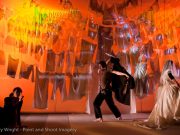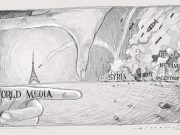Theatre in the Time of ISIS
I guess theatre could be relevant in response to global crises after all. It could be relevant once we start looking at our organizations as community support agencies in the first place; once we start seeing that our primary function is making community and art is the result; once we understand that art is only valuable when it is done in the service of people and not the other way around.
The “theatre community’s” response to the “refugee crisis”
I’m advocating a bigger, scarier form of imagination, the kind that brings us closer to ourselves – the precursor of seeing things as they really are. Because while the condition of being a human on earth is a condition we share with any other human that currently resides on earth, and while the spectrum of emotions we can experience are limited, the specificity of our experiences are not, even as they are generated through the same structures.
Could we do it? Part II
Our next challenge by extension is to find a more inclusive approach to our art. Is it possible that we could create theatre, music, dance and visual art that could include refugee artists at the ground level? International collaboration is not new to the Canadian arts scene and we may now have more of those available to us now than a generation ago. Could we actively recruit and seek out fellow artists from this specific community after they have landed on our shores? Could we create pieces with the flexibility to include another language, culture, world-view, training, instruments and traditions?









